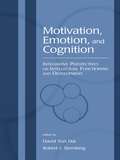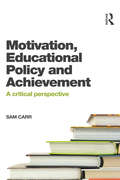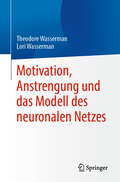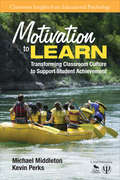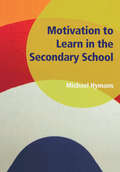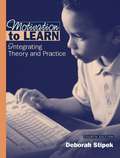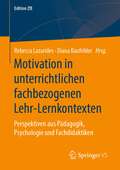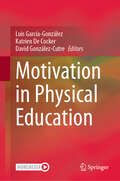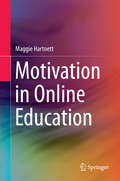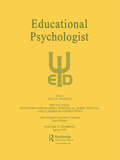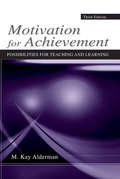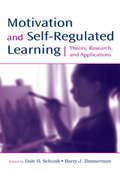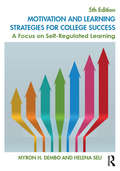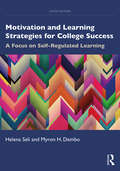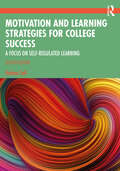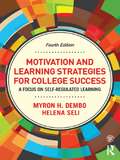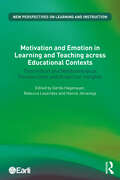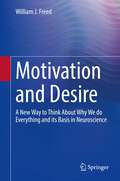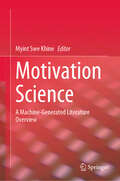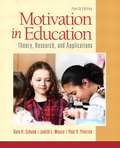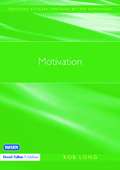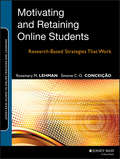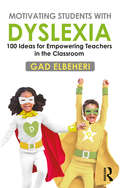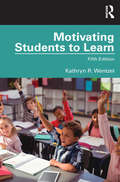- Table View
- List View
Motivation, Emotion, and Cognition: Integrative Perspectives on Intellectual Functioning and Development (Educational Psychology Series)
by Robert J. Sternberg David Yun DaiThe central argument of this book is that cognition is not the whole story in understanding intellectual functioning and development. To account for inter-individual, intra-individual, and developmental variability in actual intellectual performance, it is necessary to treat cognition, emotion, and motivation as inextricably related. Motivation, Emotion, and Cognition: Integrative Perspectives on Intellectual Functioning and Development: *represents a new direction in theory and research on intellectual functioning and development; *portrays human intelligence as fundamentally constrained by biology and adaptive needs but modulated by social and cultural forces; and *encompasses and integrates a broad range of scientific findings and advances, from cognitive and affective neurosciences to cultural psychology, addressing fundamental issues of individual differences, developmental variability, and cross-cultural differences with respect to intellectual functioning and development.By presenting current knowledge regarding integrated understanding of intellectual functioning and development, this volume promotes exchanges among researchers concerned with provoking new ideas for research and provides educators and other practitioners with a framework that will enrich understanding and guide practice.
Motivation, Educational Policy and Achievement: A critical perspective
by Sam CarrMotivation, Educational Policy and Achievement seeks to theorise and critique current trends in education through the lens of key ideas from motivational theory. Its purpose is to argue that current educational trends on a macro level are a significant threat to the provision of classroom practices seeking to create an educational environment that motivational theorists would argue is best placed to develop motivational equality, optimal motivation, and wellbeing. Linking major contemporary theories of motivation to wider educational and political debate, this unique resource will bring about two major benefits: it will vocalise and mobilise the substantial research evidence from motivational theory in order to ensure that it contributes more explicitly to a critique of current neoliberal trends, and motivation researchers will be better positioned to move the theory forward in relation to what is happening in the real world of education. Areas covered include: developing a more critical space in relation to the field of motivational psychology and contemporary educational policy; linking motivational theory to education policy and broader social and political structures; the neoliberal educational landscape; an overview of achievement goal theory and self-determination theory. Motivation, Educational Policy and Achievement is a ‘wake-up call’ for educational practitioners and policy makers and essential reading for all advanced students and researchers in the fields of educational psychology and educational research.
Motivation, Anstrengung und das Modell des neuronalen Netzes
by Theodore Wasserman Lori WassermanIn den letzten zehn Jahren hat sich unser Verständnis des menschlichen Gehirns grundlegend gewandelt – von einer modularen Struktur hin zu einem hoch integrierten neuronalen Netzwerkmodell. Dieses neue Verständnis verändert grundlegend die Art und Weise, wie wir wesentliche psychologische Konstrukte wie beispielsweise Motivation erklären. Im Netzwerkmodell wird Motivation als ein spezialisierter Aspekt des menschlichen Lernsystems betrachtet, der darauf abzielt, Ziele zu erreichen. Von ursprünglich grundlegenden Bedürfnissen wie Nahrung und Unterkunft entwickelt sich Motivation im Laufe der Zeit zu einem komplexen Geflecht aus extrinsischen und intrinsischen Zielen. Der Kern all dieser Entwicklungen ist die angeborene Flucht- oder Kampfreaktion, die sich im Laufe der Zeit durch eine Kombination aus angeborenen menschlichen Temperamentseigenschaften und Lebenserfahrungen verändert. Diese Veränderungsprozess basiert zum Teil auf einem Fehlerprognosenetzwerks, das mit dem Belohnungsnetzwerk zusammenarbeitet, um ein System sich ständig weiterentwickelnder Bewertungen von Zielen und Vorgaben zu erzeugen. Das Zusammenspiel dieser Netzwerke führt zu einem kognitiven Prozess, den wir Motivation nennen. Wie die meisten Netzwerke wird das Motivationssystem von Netzwerken rekrutiert, wenn die Aufgabenanforderungen der Situation es erfordern. Solch ein Verständnis von Motivation hat tiefgreifende Auswirkungen. In der klinischen Psychologie könnte es die Beurteilung und Therapie von Verhaltensweisen neugestalten und die Richtung für neue therapeutische Interventionen vorgeben. Dieses Buch stellt die Übersetzung einer englischsprachigen Originalausgabe dar. Die Übersetzung wurde mit Hilfe von künstlicher Intelligenz erstellt. Eine anschließende manuelle Überarbeitung erfolgte vor allem nach inhaltlichen Gesichtspunkten, so dass das Buch stilistisch von einer herkömmlichen Übersetzung abweicht.
Motivation to Learn: Transforming Classroom Culture to Support Student Achievement
by Michael J. Middleton Kevin PerksHarness the power of motivation to transform the learning experience! When properly channeled, motivation propels learning forward. Yet teachers across all grade levels and disciplines struggle to recognize and cultivate this dynamic, social force in the classroom. This essential resource proves that all students are motivated to learn, and provides authentic tools to create and sustain a classroom community that is highly engaged. You’ll discover: Reflection activities that promote student voice and self-efficacy as well as assess existing motivation levels Case studies and best practices based on current motivation theory and research Strategies to design meaningful learning tasks and build positive relationships with students and colleagues.
Motivation to Learn in the Secondary School
by Michael HymansTeachers have an enormous impact on how their students approach learning situations. Motivation to Learn in the Secondary School provides the opportunity for senior management teams to enhance learning and teaching by looking at theories of motivation and then relating these to the realities of the classroom. The book looks at the role of senior leaders and how they can encourage their staff to: explore the role that student-teacher relationships play in encouraging student motivation; highlight the importance of emotional literacy for motivating teaching and learning; explore a range of ideas to nurture motivation for the promotion of effective teaching and learning, such as accelerated learning, learning styles, multiple intelligences, meta-cognition and thinking skills. Each chapter shows how the concepts and theories convert into practice. These are identified throughout the book as TiPs (Theory into Practice) to: aid understanding of the model; encourage student motivation through particular practices. There are 38 TiPs, which include activities with handouts and information pages. These are designed for individual and/or groups of staff to use for reflection and development of action plans to promote student motivation to learn.
Motivation to Learn
by Deborah J. StipekEmphasizing classroom learning, Stipek also discusses how strategies used to motivate students in schools affect students' motivation to engage in intellectual activities outside of school. Includes an extensive list of references and numerous evaluation tools for teachers.
Motivation in unterrichtlichen fachbezogenen Lehr-Lernkontexten: Perspektiven aus Pädagogik, Psychologie und Fachdidaktiken (Edition ZfE #10)
by Rebecca Lazarides Diana RaufelderDer Band führt empirische Forschung aus Erziehungswissenschaft, Pädagogischer Psychologie und Fachdidaktiken systematisch zusammen, die sich mit schulischen und unterrichtlichen Bedingungen der Motivation Lernender befasst.
Motivation in Physical Education
by Luis García-González Katrien De Cocker David González-CutreThis book addresses the latest developments in research on motivational processes in the context of physical education and proposes successful strategies that have been scientifically proven to be effective. The book focuses on the motivational process in physical education from the perspective of students and teachers and, subsequently, on the practical applications to develop student motivation. These strategies are based on various frameworks, including the circumplex model, motivational climates, motivational teaching behaviors adapted to physical education, web-based interventions, novelty-support strategies, the use of feedback and the application of model-based practice. This book is useful to researchers and postgraduate students in the field of motivation and physical education, and physical education teachers.
Motivation in Online Education
by Maggie HartnettThis work explores and explicates learner motivation in online learning environments. More specifically, it uses a case-study approach to examine undergraduate students' motivation within two formal and separate online learning contexts. In doing so, it recognizes the mutually constitutive relationship of the learner and the learning environment in relation to motivation. This is distinctive from other approaches that tend to focus on designing and creating motivating environments or, alternatively, concentrate on motivation as a stable learner characteristic. In particular, this book identifies a range of factors that can support or undermine learner motivation and discusses each in detail. By unraveling the complexity of learner motivation in such environments, it provides useful guidelines for teachers, instructional designers and academic advisors tasked with building and teaching within online educational contexts.
Motivation for Reading: A Special Issue of educational Psychologist
by Paul R. PintrichBased on research from the National Reading Research Center (NRRC) at the Universities of Georgia and Maryland, this issue presents the contributors' sythesized work on reading motivation and engagement. Articles are devoted to the following topics: * the general motivation constructs related to reading; * home influences on reading motivation; * readers' responses to different types of text; * influences of classroom contexts; and * types of assessment on children's motivation.
Motivation for Achievement: Possibilities for Teaching and Learning
by M. Kay AldermanUnderstanding student and teacher motivation and developing strategies to foster motivation for students at all levels of performance are essential to effective teaching. This text is designed to help prospective and practicing teachers achieve these goals. Its premise is that current research and theory about motivation offer hope and possibilities for educators —teachers, parents, coaches, and administrators—to enhance motivation for achievement. The orientation draws primarily on social-cognitive perspectives that have generated much research relevant to classroom practice. Ideal for any course that is dedicated to, or includes coverage of, motivation and achievement, the text focuses on two key roles teachers play in supporting and cultivating motivation in the classroom: establishing the classroom structure and instruction that provides the environment for optimal motivation, engagement, and learning; and helping students develop the tools that will enable them to be self-regulated learners and develop their potential. Pedagogical features aid the understanding of concepts and the application to practice: Strategy boxes present guidelines and strategies for using the various concepts. Exhibit boxes include forms for different purposes (for example, goal setting), examples of teacher beliefs and practices, and samples of student work. Reflection boxes stimulate readers’ thinking about motivational issues inherent in the topics, their experiences, and their beliefs. A motivational toolbox at the end of each chapter helps readers identify important points to think about, lingering questions, strategies to use now, and strategies to develop in the future. NEW IN THE THIRD EDITION Updated research and new topics are added throughout as warranted by current inquiry in the field. Chapters are reorganized to provide more coherence and to account for new findings. New and updated material is included on issues of educational reform, standards for achievement, and high-stakes testing, and on achievement goal theory, especially regarding performance goals and the distinction between performance-approach and performance-avoidance goals as relevant to classroom practice.
Motivation and Self-Regulated Learning: Theory, Research, and Applications
by Barry J. Zimmerman Dale H. SchunkThis volume focuses on the role of motivational processes – such as goals, attributions, self-efficacy, outcome expectations, self-concept, self-esteem, social comparisons, emotions, values, and self-evaluations– in self-regulated learning. It provides theoretical and empirical evidence demonstrating the role of motivation in self-regulated learning, and discusses detailed applications of the principles of motivation and self-regulation in educational contexts. Each chapter includes a description of the motivational variables, the theoretical rationale for their importance, research evidence to support their role in self-regulation, suggestions for ways to incorporate motivational variables into learning contexts to foster self-regulatory skill development, and achievement outcomes.
Motivation and Learning Strategies for College Success: A Focus on Self-Regulated Learning
by Myron H. Dembo Helena SeliCombining theory, research, and applications, this popular text guides college students on how to become self-regulated learners. Students gain knowledge about human motivation and learning as they improve their study skills. The focus is on relevant information and features to help students to identify the components of academic learning that contribute to high achievement, to master and practice effective learning and study strategies, and then to complete self-regulation studies that teach a process for improving their academic behavior. A framework organized around motivation, methods of learning, time management, control of the physical and social environment, and monitoring performance makes it easy for students to recognize what they need to do to become academically more successful. Pedagogical features include Exercises, Follow-Up Activities, Student Reflections, Chapter-end Reviews, Key Points, and a Glossary. New in the Fifth Edition Discussion of the importance of sleep in learning and memory Revised and updated chapter on self-regulation of emotions Current research on impact of students’ use of technology including digital learning platforms and tools, social media, and online learning Updated Companion Website resources for students and instructors
Motivation and Learning Strategies for College Success: A Focus on Self-Regulated Learning
by Myron H. Dembo Helena SeliCombining theory, research, and application, this popular text guides college students on how to improve their study skills and become self-regulated learners. Seli and Dembo focus on the most relevant information and features to help students identify the components of academic learning that contribute to high achievement, to master and practice effective learning and study strategies, and to complete self-regulation studies that teach a process for improving their academic behavior.Motivation and Learning Strategies for College Success provides a framework organized around motivation, methods of learning, time management, control of the physical and social environment, and monitoring performance that makes it easy for students to recognize what they need to do to become academically successful. Full of rich pedagogical features and exercises, students will find Follow-Up Activities, opportunities for Reflection, Chapter-End Reviews, Key Points, and a Glossary. New in the Sixth Edition: General updates throughout to citations and research since the previous edition Additional coverage of digital media and mobile technology, and the impact of technology on productivity Added coverage of metacognition and test anxiety, and consideration of non-traditional students Updated companion website resources for students and instructors, including sample exercises, assessments, and instructors’ notes
Motivation and Learning Strategies for College Success: A Focus on Self-Regulated Learning
by Helena SeliNow in its 7th edition, Motivation and Learning Strategies for College Success: A Focus on Self-Regulated Learning provides a framework organized around motivation, methods of learning, time management, control of the physical and social environment, and monitoring performance that makes it easy for students to recognize what they need to do to become successful learners. Full of rich pedagogical features and exercises, students will find Follow-Up Activities, Opportunities for Reflection, Chapter-End Reviews, Key Points, and a Glossary. Seli focuses on the most relevant information and features to help students identify the components of academic learning that contribute to high achievement, to master and practice effective learning and study strategies, and to complete self-regulation studies that teach a process for improving their academic behavior. Combining theory, research, and application, this popular text guides college students on how to improve their study skills and become more effective, self-regulated learners. New in the 7th edition: Increased focus on students’ lived experiences based on race, gender, socio-economic status, and ability Increased coverage on cultural responsiveness and equity in education Additional content relevant for students with special needs Acknowledgement of the impact of COVID-19 on higher education General updates throughout to citations and research since the previous edition Updated companion website resources for students and instructors, including sample exercises, assessments, and instructors’ notes
Motivation and Learning Strategies for College Success
by Myron H. Dembo Helena SeliThis popular text combines theory, research, and applications to teach college students how to become more self-regulated learners. Study skills are treated as a serious academic course of study. Students learn about human motivation and learning as they improve their study skills. The focus is on relevant information and features designed to help students to identify the components of academic learning that contribute to high achievement, to master and practice effective learning and study strategies, and then to complete self-regulation studies whereby they are taught a process for improving their academic behavior. A framework organized around six components related to academic success (motivation, methods of learning, time management, control of the physical and social environment, and monitoring performance) makes it easy for students to understand what they need to do to become more successful in the classroom. Pedagogical Features include Exercises; Follow-Up Activities; Student Reflections; Chapter-end Reviews ; Key Point; and a Glossary. New in the Fourth Edition: More emphasis on research findings; expanded discussion of motivation ; more emphasis on the impact of students' use of social networking and technology; research about neuroscience in relationship to motivation and learning; new exercises, including web-based activities; Companion Website, including an Instructor's Manual
Motivation and Emotion in Learning and Teaching across Educational Contexts: Theoretical and Methodological Perspectives and Empirical Insights (New Perspectives on Learning and Instruction)
by Rebecca Lazarides Gerda Hagenauer Hanna JärvenojaMotivation and Emotion in Learning and Teaching across Educational Contexts brings together current theoretical and methodological perspectives as well as examples of empirical implementations from leading international researchers focusing on the context specificity and situatedness of their core theories in motivation and emotion. The book is compiled of two main sections. Section I covers theoretical reflections and perspectives on the main theories on emotion and motivation in learning and teaching and their transferability across different educational contexts illustrated with empirical examples. Section II addresses the methodological reflections and perspectives on the methodology that is needed to address the complexity and context specificity of motivation and emotion. In addition to general reflections and perspectives regarding methodology, concrete empirical examples are provided. All cutting-edge chapters include current empirical studies on emotions and motivation in learning and teaching across different contexts (age groups, domains, countries, etc.) making them applicable and relevant to a wide range of contexts and settings. This high-quality volume with contributions from leading international experts will be an essential resource for researchers, students and teacher trainers interested in the vital role that motivation and emotions can play in education.
Motivation and Desire: A New Way to Think About Why We do Everything and its Basis in Neuroscience
by William J. FreedSome of our time is spent eating and drinking and some is spent on matters regarding reproduction. Some of us seek fame or recognition while others seek satisfaction internally, with little need for recognition. Some people study for success in a profession, while others might study rocks, birds, or French literature for no apparent reason other than to know about it. Why are we motivated to engage in so many apparently unrelated activities? This book places our various activities into categories, thus providing a framework for understanding how everything that we do fits together and is based on brain mechanisms. Disturbances in motivation play important roles in autism, depression, Parkinson's disease, and addiction. Understanding the motivational aspects of these disorders can help to inform our approach to these conditions. This book may be of value for students in psychology, counseling, management, and anyone who is interested in understanding our daily behavior.
Motivation Science: A Machine-Generated Literature Overview
by Myint Swe KhineThis volume explores human-machine collaboration and provides machine-generated auto-summaries of emerging research trends in motivation science. Each chapter presents summaries of pre-defined themes and includes an editor-written introduction. It covers various topics, from classic theories such as Maslow's hierarchy of needs to cutting-edge research in neuroscience and cultural influences on motivation. The book offers valuable insights into what makes us tick and how to harness motivation to improve our lives. The book is organized into six chapters covering interrelated topics such as the motivation science, emotion-based motivation, educational motivation, self-regulated learning, motivation and technology, and motivation and neuroscience. The auto-summaries have been generated by a recursive clustering algorithm via the Dimensions Auto-summarizer by Digital Science. The editor of this book selected which SN content should be auto-summarized and decided its order of appearance. Please note that these are extractive auto-summaries, consisting of original sentences, but are not representative of the original paper, since we do not show the full length of the publication. Please note that only published SN content is represented here, and that machine-generated books are still at an experimental stage.
Motivation In Education: Theory, Research, And Applications
by Dale H. Schunk Paul R. Pintrich Judith L. MeeceThe academic standard for texts on motivation in educational settings. Clear and engaging, Motivation in Education: Theory, Research, and Applications, Fourth Edition presents the major motivation theories, principles, and research findings in sufficient detail to help students understand the complexity of motivational processes, and provide it provides extensive examples of the application of motivational concepts and principles in educational settings.
Motivation (nasen spotlight)
by Rob LongIf teachers can motivate pupils, their job is more than half done! Knowing how to interest and motivate pupils is a skill, which separates the "great" teacheres from the mediocre, This book will inform and inspire staff and give them confidence in dealing with pupils who are not naurally "teacher pleasers". This book examines: how personality affects learning styles assessment tools and interventions how to reach the hard to teach.
Motivating and Retaining Online Students: Research-Based Strategies That Work (Jossey-Bass Guides to Online Teaching and Learning)
by Rosemary M. Lehman Simone C. ConceiçãoFinally, the first research-based book of sound strategies and best practices to help instructors motivate students to complete their online courses. Although studies support the effectiveness of learning online, students often fail to complete online courses. Some studies have found that as many as 50–70% drop out of their online courses or programs. Retention is not only a growing expectation and imperative, but it is also as opportunity for faculty members to take the lead in innovating, researching, and implementing new strategies while demonstrating their effectiveness. Designed for instructors and instructional designers, Motivating and Retaining Online Students is filled with empirical research from the authors’ study of motivation and retention strategies that can reduce online learner dropout. Focusing on the most important issues instructors face, such as course design; student engagement and motivation; and institutional, instructional, and informal student support strategies, the book provides effective online strategies that help minimize student dropout, increase student retention, and support student learning. While helping to improve the overall retention rates for educational institutions, the strategies outlined in the book also allow for student diversity and individual learner differences. Lehman and Conceição’s proven model gives instructors an effective approach to help students persist in online courses and succeed as learners.
Motivating Your Secondary Class
by Charlotte Page Maurice J. Galton Susan Steward Anthony Pell Linda HargreavesWhy do so many pupils in Years 7, 8 and 9 'switch off' and make very little progress in the core subjects such as English and mathematics? What can teachers and schools do to improve pupils' attitudes and motivation? Maurice Galton and his team have collected examples from various schools of what works in re-energising demotivated pupils. This book presents practical advice and strategies for improving lower secondary school classrooms, ranging from reducing class size, to innovative induction programmes emphasising the development of core study skills, and developing effective procedures to train pupils to cooperate rather than confront each other during lessons. Chapters cover: - Making a Good Start to Secondary Education. - Creating a Cooperative Classroom Climate - Improving Communication between Pupils and Teachers - Why are some classrooms more successful? - How can school structures influence positive relationships? The book is a much-needed resource for all secondary teachers, and is particularly useful for year and subject heads.
Motivating Students with Dyslexia: 100 Ideas for Empowering Teachers in the Classroom
by Gad ElbeheriBursting with concise and clear advice, in this book Gad Elbeheri explores why motivation for pupils with dyslexia can drop, and how this can be addressed before it impacts on learning. Motivating Students with Dyslexia provides a variety of ideas for improving motivation, all one hundred tried and tested, and can be applied in the classroom immediately. With a focus on enhancing the skills and the self-sufficiency of teachers, this essential resource provides: An accessible summary of the theoretical groundings to motivation. A clear rationale of why particular strategies should be used. Advice on how to successfully plan, execute and evaluate learning at school and at home. Ideal for teachers and SENCos around the world who are looking to improve or diversify motivation techniques for students with dyslexia, this book is a brilliant toolkit of inspiring ideas for increasing motivation among students with dyslexia at all levels of education.
Motivating Students to Learn
by Jere Brophy Kathryn R. WentzelWritten specifically for teachers in training, Motivating Students to Learn offers a wealth of research-based principles on student motivation for use in the classroom. Positioning the teacher as the decisive motivator, the book is grounded in the realities of contemporary schools, curriculum goals, and peer dynamics. Twelve rich chapters offer extrinsic and intrinsic approaches to guide daily practice, guidelines for adapting to group and individual differences, and ways to reach discouraged or disaffected students. This revised fifth edition features new instructional strategies, summaries of effective interventions, chapters on family/cultural diversity and teacher motivation, and more.
